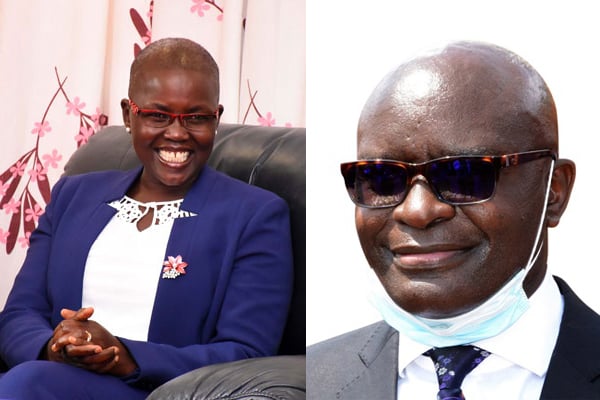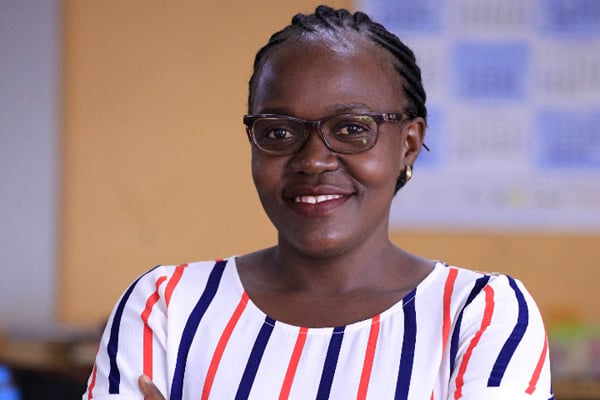Prime
Supreme Court blocks Constitutional Court order rendering DPP Abodo, EC’s Byabakama powerless

DPP Justice Jane Frances Abodo and Electoral Commission Chairperson Justice Simon Byabakama
What you need to know:
- In their application for the interim order, the DPP’s office argued that the Kasango decision had caused a prosecution crisis as they were unable to perform their functions as enshrined under Article 120 of the Constitution.
- Kasango had successfully reasoned that the appointment of then High Court judge Chibita to the position of chief government prosecutor, had caused a fusion of the Executive and the Judiciary, hence undermining the independence of the Judiciary and separation of powers that the constitution provides.
The Supreme Court has reinstated the Director of Public Prosecutions, Jane Frances Abodo, the chairperson of the Electoral Commission, Simon Mugenyi Byabakama and the chairperson of the Judicial Service Commission, Benjamin Kabiito into their offices days after the Constitutional Court ruled that they were illegally there.
The trio’s work had been curtailed following the land mark Constitutional Court judgment delivered on March 18.
The judgment arose from a petition filed by the late lawyer, Robert Aldridge Kasango aka Bob, who was among others, challenging the appointment of judges into the executive arm of government or to a constitutional posting without first resigning from the Judiciary.
“We have heard this application exparte (one-sided). We have given the application due consideration, we find that the matter raised in the application are substantially important for court’s guidance. Accordingly, we allow the application, and hereby grant an interim order, staying the execution of orders of the Constitutional Court,” Justice Paul Mugamba ruled on Wednesday on behalf of a panel of five justices of the Supreme Court.
“This order shall remain in force until the disposal of the substantive application number 1 of 2021 for stay of the execution or any other order. Costs shall be in the course,” he added.
The other justices were; Chief Justice Alfonse Owiny-Dollo, Stella Arach-Amoko, Rubby Aweri Opio and Ezekiel Muhagunzi.
The court decided after hearing one side because Kasango who was the respondent, died on February 28 at Luzira prison and was buried March 28 after a protracted family dispute on where his remains would be buried.
In their application for the interim order, the DPP’s office argued that the Kasango decision had caused a prosecution crisis as they were unable to perform their functions as enshrined under Article 120 of the Constitution.
They said the same judgment had created a legal lacuna in the delivery of criminal justice and needed to be overturned.
Likewise, the Electoral Commission (EC), had argued that continuation of their election related activities like conducting the swearing-in of President Museveni on May 12, and handling of several parliamentary elections, was hanging in balance due to the same decision.
This was because the Kasango decision had rendered the EC boss powerless and would not be able to present President Museveni to the Chief Justice on May 12, as the president elect for the formal swearing-in.
The Judicial Service Commission, had not been spared as well since its head, Justice Kabiito had been stripped off his powers.
This was because he could not preside over the commission to conduct the recruitment of close to 30 judicial officers for this calendar year.
The Kasango decision came at the time when the commission was in the process of recruiting one Supreme Court justice, two Court of Appeal justices, and four judges of the High Court, eight deputy registrars, four assistant registrars, five Chief Magistrates and five grade one magistrates.
Kasango had successfully reasoned that the appointment of then High Court judge Chibita to the position of chief government prosecutor, had caused a fusion of the Executive and the Judiciary, hence undermining the independence of the Judiciary and separation of powers that the constitution provides.
He had also argued that the unconstitutional appointment of Justice Chibita and his subsequent prosecution by him, was unlawful and void.
“Henceforth, the appointment and actions of a judge to any other executive or constitutional office prior to his or her resignation renders his or her actions invalid,” ruled Justice Kenneth Kakuru, who wrote the lead judgment on March 18, this year.
The other justices on the panel were; Geoffrey Kiryabwire, Cheborion Barishaki, Stephen Musota and Muzamiru Mutangula Kibeedi.
Justice Kakuru further implored the affected judicial officers to obey the court decision since they are the custodians of the constitution.



